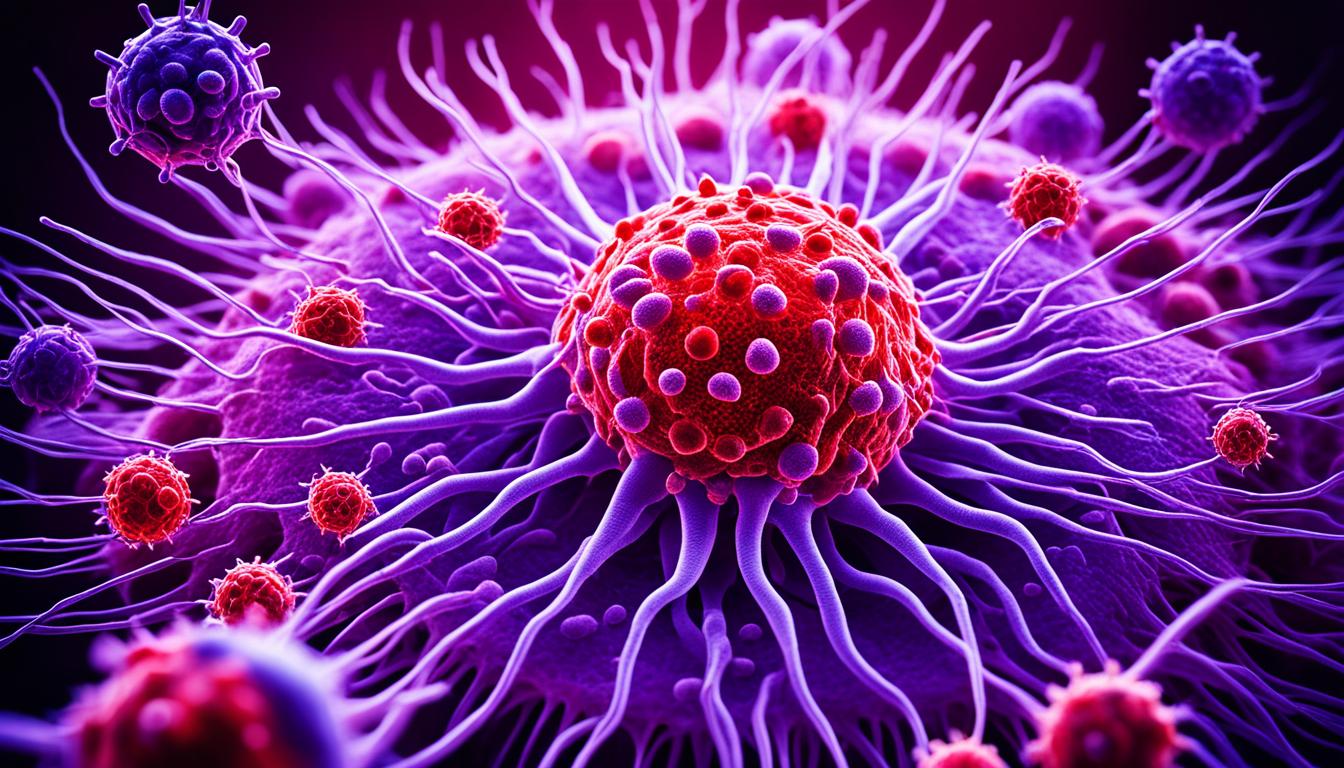Cytomegalovirus (CMV) is a common virus that affects some individuals. Most healthy people don’t show symptoms. But, pregnant women and those with weak immune systems are more at risk. CMV spreads through bodily fluids. Unfortunately, there is no cure.
The symptoms of CMV can vary. You might feel tired, have a fever, a sore throat, and muscle aches. If you feel unwell and have a weak immune system, see a doctor. They can diagnose CMV with tests like blood and urine tests, biopsies, and eye checks. They might also use imaging tests.
Treatment usually means taking antiviral medications to make you feel better. Also, it’s important to practice good hygiene to avoid spreading CMV.
Key Takeaways:
- Cytomegalovirus (CMV) affects certain people but most don’t show symptoms.
- Pregnant women and those with weak immune systems are more vulnerable to CMV.
- It spreads through bodily fluids and there is no cure.
- Symptoms may include feeling tired, having a fever, and muscle aches.
- Diagnosis involves several tests like blood and urine tests, and eye checks.
- Antiviral medications are used to treat CMV symptoms.
- Good hygiene is key to prevent CMV from spreading.
Cytomegalovirus in Newborns and Infants: Signs, Complications, and Management
Newborns and infants face a greater risk of cytomegalovirus (CMV) infection. This infection can lead to various signs and symptoms. There are two types of CMV infection – congenital and perinatal.
In congenital CMV, babies get the virus from their moms before birth. At first, these babies might seem fine. But some could later show signs like not hearing well or lagging in learning. Other babies may be sick at birth, showing signs like being born too soon, being small, or having skin rashes.
Babies affected by congenital CMV might face complications that last. These could include problems with hearing, learning, seeing, and moving. It’s really important to keep an eye on these babies. Testing their hearing and vision early can help start managing any issues sooner.
Cytomegalovirus in People with Weakened Immunity: Risks, Complications, and Treatment
People with weak immune systems are more likely to have problems from CMV. This includes those who have had an organ transplant or have HIV. CMV can harm many parts of the body like the eyes, lungs, liver, and more.
CMV can lead to serious problems like eye retinitis or brain encephalitis. These issues can really affect the health and life of those with weak immune systems.
Treating CMV in these patients often means using antiviral drugs. These drugs can help reduce symptoms and stop the virus from getting worse. Checking closely and seeing the doctor regularly are very important. This is to catch any issues early and prevent major problems.
Common CMV Complications in Immunocompromised Individuals
| Organ/System | Complication |
|---|---|
| Eyes | Retinitis |
| Intestines | Colitis |
| Brain | Encephalitis |
| Lungs | Pneumonia |
| Liver | Hepatitis |
Regular visits with doctors who know about CMV are key. These visits help find and treat problems early. This can make life better for patients.
Using antiviral drugs and checking up often leads the treatment for CMV. But it’s important to know there is no cure for CMV. The treatment is about controlling symptoms and stopping the virus’s progress.
Conclusion
Cytomegalovirus (CMV) infection is a viral infection that’s quite common. It can be very serious for those with weakened immune systems or pregnant women. Even if you’re healthy, it’s key to catch it early and handle it well.
While we can’t yet cure CMV, special medicines can help with symptoms. They also lower the chances of bad outcomes. Keeping things clean, especially around kids, is important to stop CMV from spreading.
There’s hope in the fight against CMV, thanks to ongoing research and vaccines in development. With more work, we might lower how much CMV hurts those who are most at risk.

